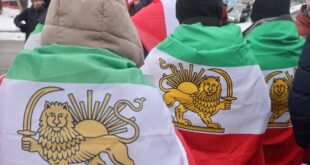BAGHDAD (AFP) — Defence witnesses in Saddam Hussein’s trial over the killings of Iraqi Shiite villagers claimed many of those allegedly executed were still alive and said the prosecution case was built on bribes.
One witness said he was a teenager in Dujail in 1982 when an attempt on Saddam’s life led to what the prosecution has termed a massive crackdown on the village, hundreds of arrests and the execution of 148 men.
“The prosecutor said they were executed but I am telling you I ate with them some time ago” and that 23 of them were alive, said the witness, who had worked at Baghdad’s Abu Ghraib prison in the mid-1980s.
“Many of them have gotten rich and occupy powerful positions,” he said, as he testified from behind a curtain, going on to write down names for the judge.
“If it is true and these people are still alive, this whole case should be reconsidered from the beginning,” said the lawyer for Awed Bandar, whose revolutionary court under Saddam sentenced the men to death in 1984.
A second witness, a shepherd from Dujail, also said many of the people that had supposedly been killed were still living.
“This name is supposed to have been executed, but he is now having a son and he has married twice. I was invited to his wedding in May,” said the witness, who also testified anonymously.
Saddam and seven associates are on trial for crimes against humanity stemming from the arrests, torture and execution of Dujail villagers as well as the destruction of their property.
The witnesses charged that the whole case was fabricated.
At a July 2004 gathering in Dujail, “someone came and asked for witnesses, saying the Iranians will thank them and if they don’t have the necessary documents he could forge them,” he said.
“And this man was [chief] prosecutor [Jaafar] Mussawi,” said the witness, who added that many Dujail villagers who went on to testify against Saddam were at that meeting.
The prosecutor promptly rebutted the allegations.
“I just want to clarify this for the records. I was born in Baghdad and I never went to Dujail. On July 8, 2004, I wasn’t a prosecutor, I had nothing to do with the court,” said Mussawi.
The Dubai-based news channel Arabiya, however, broadcast Tuesday a video showing Mussawi in Dujail together with one of the prosecution witnesses at an event to commemorate the killings.
It did not give a date for the video.
Both witnesses claim Mussawi was in Dujail, and Saddam defence lawyer Khalil Dulaimi announced he had a recording of the event.
Mussawi then called for the next session to be closed to the public — a request the judge did not immediately address.
The session was adjourned until Wednesday.
One of the defence lawyers, meanwhile, said a defence witness who testified recently had been killed, a claim that could not be confirmed.
Throughout the trial, the defence has claimed that prosecution witnesses against the ousted president and his co-defendants were coached and induced to testify.
The latest testimony, which caused a stir in the courtroom, came after presiding judge Rauf Abdul Rahman expressed frustration at the defence’s constantly expanding list of witnesses.
“Every day the defence team gives us a new list of witnesses. We will never be finished with listening to witnesses,” an exasperated Abdul Rahman said at the opening of the case’s 30th hearing.
The eight defendants face execution by hanging if found guilty of charges including murder and torture.
The trial, which opened on October 19, has been marred by the murder of two defence lawyers and the January resignation of the first chief judge.
Once defence testimony is complete, defence lawyers will give their closing statements, followed by defendants’ final statements, which will mark the end of the trial.
The proceedings could conclude by the end of June, a US official close to the court said last week, with a verdict coming as early as July.
International human rights advocates say the trial, taking place in Baghdad’s highly fortified Green Zone, is being conducted well below international legal standards.
 Eurasia Press & News
Eurasia Press & News



